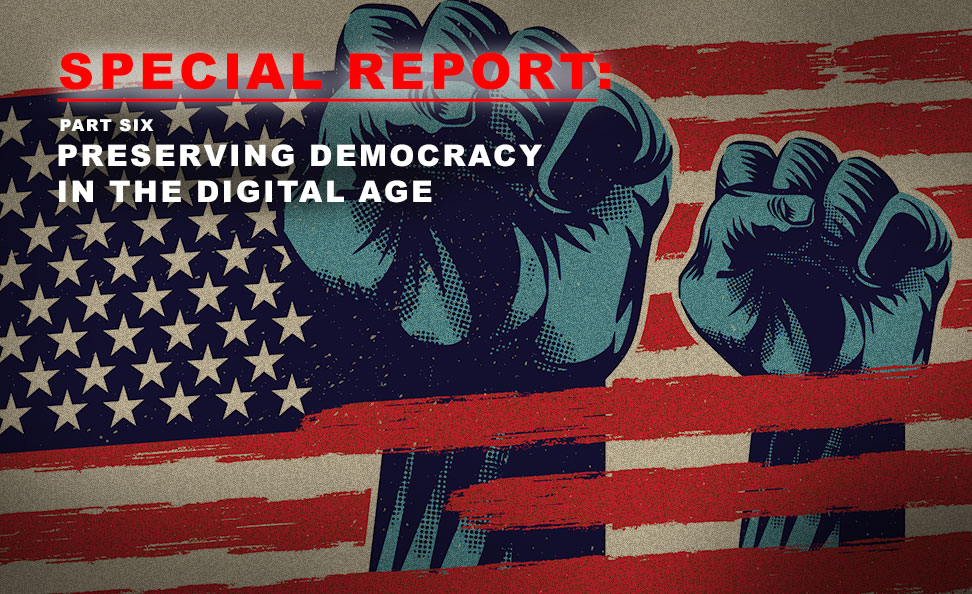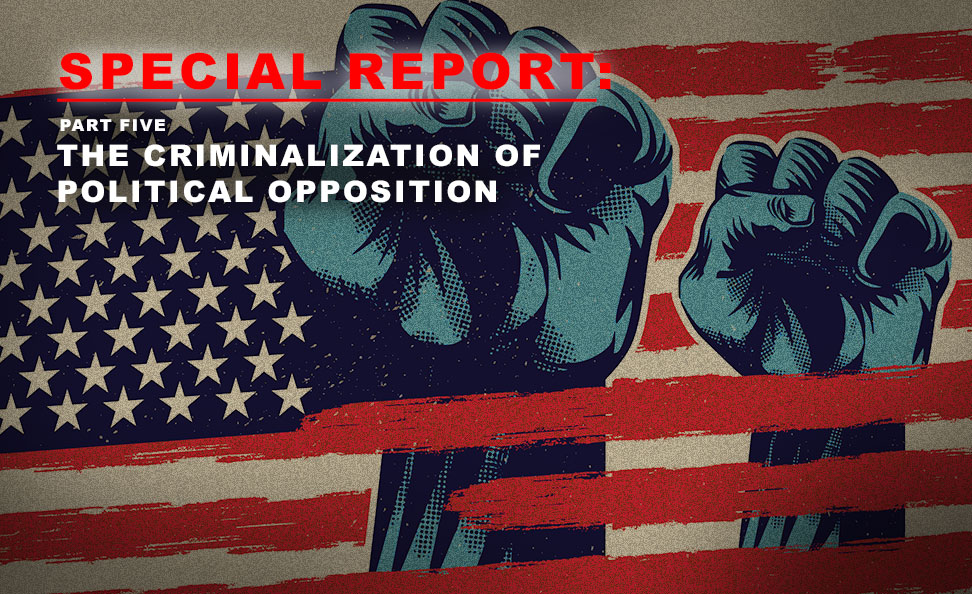Throughout this series, we’ve traversed a landscape that might seem, at moments, nearly unrecognizable from the democracy we’ve come to cherish—a democracy founded on the principles of freedom, equality, and the unwavering belief in the power of our collective voice. From the rise of authoritarian tendencies to the double-edged sword of digital innovation, we’ve explored the multifaceted challenges that confront our democratic ideals in the digital age.
But this is not a story of defeat. Rather, it’s a rallying call to action, a reminder that the very essence of democracy lies in our ability to adapt, overcome, and preserve the core values that unite us, regardless of our political affiliations.
As we stand at the crossroads of digital evolution and democratic preservation, it’s imperative that we harness the tools and technologies of our time not as instruments of division, but as conduits for greater transparency, inclusion, and freedom.

Embracing Transparency and Accountability
Transparency, often lauded but less frequently practiced, forms the bedrock of a truly democratic society. In a world increasingly shaped by digital interactions, the principle of transparency must evolve beyond mere rhetoric into a tangible framework that underscores every facet of governance. The digitization of our world, while opening new avenues for information dissemination, also presents novel challenges in maintaining and advocating for an open government.
Transparency in the digital age transcends the traditional call for open governmental meetings and public access to documents; it demands a reimagined notion of accessibility, one where data and decision-making processes are not only visible but comprehensible and interactive. Technology has the power to bridge the gap between government actions and citizen oversight, making real-time updates, data analytics, and decision-making rationale accessible to every citizen with internet access. However, this technology must be leveraged responsibly and ethically, ensuring that information is not just available but also equitable in its reach.
Implementing stronger transparency measures in the digital age means developing digital platforms that can deliver complex information in user-friendly formats. Dashboards that track government spending, legislative processes, and public service outcomes in real-time can illuminate previously opaque systems. Yet, accessibility alone isn’t enough; information must be presented in a manner that is understandable to individuals without specialized knowledge, breaking down complex bureaucratic language into clear, actionable insights.
Accountability, the counterpart to transparency, ensures that there is a mechanism for recourse and correction when discrepancies arise. In the era of digital governance, accountability mechanisms can be significantly amplified through technology. For instance, blockchain technology offers an immutable record of transactions and decisions, presenting a new frontier for tracking government actions and ensuring they align with public commitments and legal frameworks. Digital platforms can facilitate public feedback loops, enabling citizens to report issues, offer solutions, and directly participate in the governance process.
Fostering trust between the government and its people is a nuanced endeavor, especially in times where misinformation can spread as rapidly as legitimate information. Transparency and accountability act as antidotes to skepticism and cynicism, building a foundation of trust that is essential for the social compact to thrive. It is crucial for governments to not only adopt transparent practices but to actively involve citizens in shaping what transparency should look like in the digital era, ensuring policies and practices reflect the needs and values of the community.
Cultivating Inclusive Digital Spaces

The promise of the digital age, heralded as a great equalizer, remains unfulfilled for vast swathes of the global population. The potential to democratize access to information, education, and participation hinges on our collective commitment to bridging the digital divide—a divide that separates not only those with access to technology from those without but also those who can effectively utilize digital tools from those who cannot.
Creating inclusive digital spaces requires a multifaceted approach, addressing both infrastructural barriers and socio-economic disparities that limit access to technology. This means expanding high-speed internet access to underserved areas, providing affordable devices and software, and implementing programs that equip individuals with the digital literacy skills necessary to navigate, contribute to, and benefit from the digital world. However, inclusivity extends beyond physical access; it encompasses the creation of digital environments that are welcoming and accessible to all, regardless of age, language, disability, or cultural background.
Moreover, inclusivity in digital spaces involves the active engagement of diverse perspectives in the design, development, and deployment of digital tools. This participatory approach ensures that platforms and technologies reflect the needs and experiences of a broad spectrum of society, fostering digital environments that are not only accessible but relevant to the everyday lives of all users. Community-driven technology projects, co-design processes, and user feedback systems are instrumental in cultivating digital spaces that resonate with and empower diverse populations.
Democracies thrive on the strength of their inclusivity—the ability to incorporate a multitude of voices, experiences, and perspectives into the fabric of public life. In the digital realm, this means creating platforms that not only allow for but encourage constructive dialogue and meaningful participation. From accessible online forums and social media platforms to digital town halls and participatory budgeting tools, technology offers unprecedented opportunities to engage in civic life, deliberate on public matters, and influence decision-making processes.
However, inclusivity also demands vigilance against digital spaces becoming arenas for harassment, disinformation, and exclusionary practices. Safeguarding the dignity of all participants is paramount, requiring mechanisms for moderation, fact-checking, and the protection of personal privacy and data. By committing to the creation of digital spaces that respect and uplift every voice, we can ensure that the digital age serves to enhance, rather than erode, the democratic principle of inclusion.
Safeguarding Our Rights and Freedoms
In the tapestry of contemporary society, woven with threads of rapid digital transformation, the safeguarding of our fundamental rights and freedoms emerges as a paramount concern. The digital age, while prolific in opportunities, harbors the dual-edged sword of innovation and infringement, especially concerning privacy, free speech, and the right to dissent. The very essence of democracy, characterized by these freedoms, finds itself at a critical juncture — under the looming shadow of potential erosion.
Protection of individual rights in the digital realm necessitates a vigilant and proactive stance. It is incumbent upon us to demand and advocate for comprehensive policies that not only react to violations but anticipate and preclude potential encroachments. Data protection laws serve as a bulwark against the unauthorized exploitation of personal information, signaling the need for a global consensus on digital privacy standards. Furthermore, mechanisms ensuring the integrity of our digital identities must be robust, transparent, and inclusive, preventing any form of digital disenfranchisement.
The erosion of privacy is particularly troubling, juxtaposed against the increasing ubiquity of digital surveillance tools. From state-operated mass surveillance programs to corporate data mining, the sanctity of personal privacy dwindles, often justified under the guises of security and commercial interest. This encroachment threatens the bedrock of individual autonomy and freedom, necessitating a resolute stance and concerted action to reclaim and protect our digital privacy.
Free speech, another cornerstone of democratic society, faces challenges from censorship, digital manipulation, and the spread of misinformation. The digital public square, while expansive, is fraught with risks that can undermine factual discourse and amplify division. Ensuring that digital platforms do not become arbitrators of truth while combating harmful content is a delicate balance that requires nuanced policies, emphasizing transparency, due process, and accountability.
The criminalization of political dissent, a trend manifest in various forms around the globe, underscores the urgency for safeguarding channels of free expression. Digital platforms, which have become pivotal arenas for political dialogue and activism, must be protected as spaces where dissenting voices can flourish without fear of repression or retaliation.
Empowering Civic Participation
True democracy thrives on the active participation of its citizenry. Digital tools and technologies offer unprecedented opportunities to foster civic engagement, thereby enhancing the vibrancy and resilience of our democratic institutions. The imperative to leverage these digital tools cannot be overstated, as they possess the potential to revolutionize how citizens interact with each other and with their government.
Online platforms that facilitate community organizing and social activism can play a crucial role in mobilizing grassroots movements, enabling individuals to coalesce around common causes and advocate for change. These digital channels democratize access to information, allowing for a more informed electorate that can engage in the political process with knowledge and conviction.
Digital voting systems exemplify another transformative application of technology, expanding access to the electoral process, thereby making it more inclusive and accessible. While concerns around security and integrity remain paramount, the potential for digital voting to increase voter turnout and participation is significant. Innovations in encryption and blockchain technology may hold the key to secure, verifiable online voting systems that could redefine electoral engagement.

However, enhancing civic participation extends beyond digital tools; it requires a foundational commitment to digital literacy and education. Ensuring that all citizens are equipped with the skills to navigate, understand, and engage with digital platforms is essential. Digital literacy initiatives must be inclusive, addressing the diverse needs of communities to prevent any form of digital disenfranchisement.
Envisioning a Collaborative Future
The path to preserving democracy in the digital age is undeniably complex, interwoven with challenges that test the resilience of our democratic values. Yet, within these challenges lies the potential for innovation, growth, and a strengthened democratic fabric. Achieving this vision demands a collaborative ethos, one that bridges divisions and fosters a collective commitment to the common good.
Engaging in open, constructive dialogue among policymakers, technologists, and citizens is crucial. Policymakers must be attuned to the rapid pace of technological change, crafting regulations that protect individual rights while encouraging innovation. Technologists and developers have a pivotal role in designing ethical, transparent, and inclusive technologies that empower rather than undermine democracy. Citizens, empowered with digital literacy and civic awareness, can hold institutions accountable and drive positive change.
This collaborative future also hinges on cross-sectoral partnerships and global cooperation. The challenges posed by the digital age transcend national borders, requiring a concerted effort among nations to establish international norms and agreements that safeguard democracy. By sharing knowledge, resources, and best practices, the global community can forge a path that harnesses the potential of technology to enhance, rather than erode, democratic values.
The Role of Privacy and the Right to Privacy
At the heart of the discourse on digital rights is the fundamental right to privacy. Privacy, enshrined in numerous international declarations and constitutions, encompasses the sanctity of individual autonomy, the confidentiality of communication, and the security of personal data. In the digital age, this right is under unprecedented strain, faced with new forms of collection, processing, and dissemination of personal information.

Reaffirming the right to privacy necessitates a comprehensive understanding of privacy not as a uni-dimensional right but as a multi-faceted concept that intersects with freedom of expression, security, and access to information. Ensuring privacy in the digital age means protecting individuals from unauthorized surveillance, data breaches, and the exploitation of personal data for unforeseen purposes.
Privacy-preserving measures, such as end-to-end encryption and data minimization, must become standard practices, embedded within the development and deployment of digital technologies. Legal frameworks, too, must evolve to keep pace with technological innovation, providing robust protections for personal data while fostering an environment in which freedom of expression and information flourish.
Moreover, the right to privacy encompasses the ability to exercise control over one’s personal information — the principle of data sovereignty. This includes the right to access, rectify, and, in certain contexts, delete personal information held by both public and private entities. Empowering individuals with control over their data restores autonomy, builds trust, and reinforces the participatory nature of democracy.
The defense of privacy in the digital realm is not merely a question of policy or technology; it is a fundamental issue of human dignity and democracy. As we navigate the complexities of the digital age, let us remain steadfast in our commitment to protecting the right to privacy, recognizing its intrinsic value to the free, open, and democratic societies we strive to maintain and enhance.
Wrap Up
Through this journey, one thing has become abundantly clear: the path towards preserving democracy in an increasingly digitized world is fraught with complexities, yet it is navigable with collective will, innovation, and unwavering dedication to our fundamental values.
The rise of digital technologies presents a double-edged sword; on one hand, it offers innovative tools to enhance civic participation, streamline governance, and foster global connections. On the other, it poses significant risks to privacy, free speech, and the very fabric of democratic society. The balance between leveraging digital advancements and safeguarding our rights and freedoms is delicate, requiring careful consideration, ethical frameworks, and robust legal protections.
The cornerstone of our democratic resilience lies in safeguarding our rights and freedoms. Protecting individual privacy, ensuring the integrity of our digital identities, and preserving the sanctity of free speech and political dissent are not just legislative issues—they are moral imperatives. Moreover, empowering civic participation transcends mere encouragement; it demands active facilitation through accessible, secure, and transparent digital tools that invite wide-reaching engagement and informed electorate activism.
The future of democracy in the digital age is not predetermined. It is a canvas upon which we have the power, and indeed the responsibility, to paint a picture that reflects our highest aspirations for a just, free, and inclusive society.
Let this series serve not as a final word, but as a catalyst for ongoing discussion, innovation, and action.
May we all contribute to shaping a digital future where democracy does not merely survive but flourishes for generations to come.








